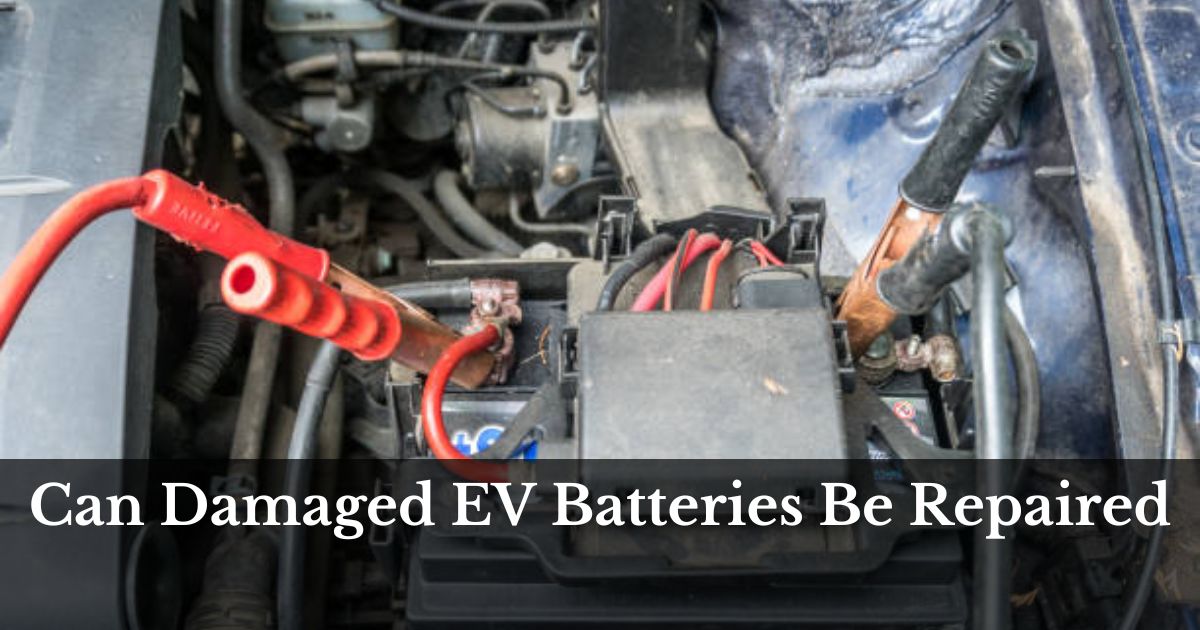Can damaged EV batteries be repaired, Electric cars are getting more popular because they’re good for the environment and can save money. But some people who own electric cars worry about their battery getting damaged. They wonder: Can you fix a damaged electric car battery? In this article, we’ll talk about whether it’s possible to repair damaged electric car batteries and look at what options are out there for people dealing with this problem.
Electric vehicles (EVs) have gained significant traction in recent years as environmentally friendly alternatives to traditional gasoline-powered cars. Central to the operation of these vehicles are their lithium-ion batteries, which store and provide the energy needed to power the electric motor. However, like any other component, EV batteries are susceptible to damage over time. This raises an important question: Can damaged EV batteries be repaired?
Understanding Battery Damage
Before delving into whether damaged EV batteries can be repaired, it’s essential to understand the types of damage they can sustain. Battery damage can occur due to various factors, including overcharging, over-discharging, physical impact, exposure to extreme temperatures, and general wear and tear. These factors can lead to issues such as capacity degradation, internal shorts, electrode corrosion, and cell swelling, ultimately affecting the performance and lifespan of the battery.
Can Damaged EV Batteries Be Repaired?
The possibility of repairing damaged EV batteries largely depends on the extent and nature of the damage. In some cases, minor issues such as cell balancing or replacing faulty modules can be addressed through repairs, restoring the battery to its optimal functioning. However, more severe damage, such as extensive electrode degradation or internal shorts, may render the battery irreparable, necessitating replacement.
Factors Affecting Repairability
Several factors influence the repairability of damaged EV batteries. The complexity of modern lithium-ion battery packs, comprising numerous cells and intricate electronics, poses challenges to repair efforts. Additionally, the availability of replacement parts, technical expertise, and cost-effectiveness play crucial roles in determining whether repair is a viable option.
Safety Concerns and Regulations
Safety is paramount when dealing with damaged EV batteries. Repairing lithium-ion batteries requires specialized knowledge and equipment to mitigate the risk of thermal runaway and other safety hazards. Moreover, regulatory standards govern the handling and disposal of damaged batteries, ensuring compliance with safety protocols and environmental regulations.
Emerging Technologies in Battery Repair
Advancements in battery repair technologies offer promising solutions for addressing damaged EV batteries. Techniques such as battery reconditioning, where the battery’s performance is optimized through controlled charging and discharging cycles, show potential for extending the lifespan of EV batteries. Furthermore, research into innovative materials and processes aims to develop more robust and sustainable battery technologies.
The Future of EV Battery Repair
As EV adoption continues to grow, so does the demand for effective battery repair solutions. The future of EV battery repair lies in the development of advanced diagnostics, repair methodologies, and recycling techniques. Collaborative efforts between manufacturers, researchers, and regulatory bodies are essential for fostering innovation and ensuring the sustainability of EV battery repair practices.
In conclusion, while repairing damaged EV batteries is feasible in some cases, it depends on various factors such as the extent of damage, available resources, and safety considerations. As technology advances and awareness of environmental sustainability increases, the future of EV battery repair looks promising. However, it’s crucial to prioritize safety, efficiency, and regulatory compliance in all repair endeavors to maximize the lifespan and performance of EV batteries.
FAQs
Can I repair a damaged EV battery myself?
Repairing damaged EV batteries requires specialized knowledge and equipment. It’s advisable to seek assistance from trained professionals to ensure safety and effectiveness.
Are there any risks associated with repairing EV batteries?
Yes, repairing EV batteries involves risks such as thermal runaway and exposure to hazardous materials. Proper safety precautions should be followed to mitigate these risks.
How long does it take to repair a damaged EV battery?
The time required to repair a damaged EV battery depends on the extent of damage and the complexity of the repair process. Minor repairs may take a few hours, while more extensive repairs could take days or even weeks.
Is repairing an EV battery cost-effective compared to replacement?
It depends on the nature and severity of the damage. In some cases, repairing an EV battery may be more cost-effective than replacing it entirely, especially for minor issues.
What should I do with a damaged EV battery that cannot be repaired?
Proper disposal and recycling of damaged EV batteries are essential to prevent environmental contamination. Contact your local authorities or recycling facilities for guidance on safe disposal methods.



